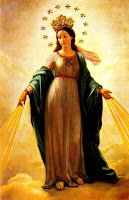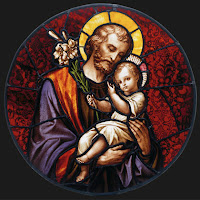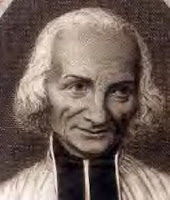4TH
SUNDAY IN ORDINARY TIME B
YEAR OF THE CLERGY
AND CONSECRATED PEOPLE
January 28, 2018
Jesus, I trust in you!
Who is the prophet? Many of us
mistakenly think that a prophet is a man who predicts the future, a clairvoyant
of sorts. But the word of God today tells us otherwise. The first reading
speaks of a prophet as one on whose mouth God puts his words, a man who shall
tell people what the Lord commands him. He speaks in the name of the Lord. He
is called to be faithful to the word that he had received, and transmit it as
such to God’s people.
Called to be the faithful
communicator of God’s word (and not his own), his ministry would lead him to
primarily denounce evil in all its forms, and call to conversion. The prophets
of the Old Testament were men who denounced evil and constantly called people
to conversion.
However, these are nothing in
comparison with Jesus. The Lord told his people that he shall raise up a
prophet like Moses among their kinsmen. This refers to Jesus himself. While the
prophets of old spoke in the name of the Lord, the Lord Jesus spoke with
authority. “A completely new teaching with a spirit of authority,” so people
exclaimed about Jesus. This authority is his own because Jesus is the only
Begotten Son of God. This authority cannot be denied even by the evil spirits
who said to him: “What have you to do with us, Jesus of Nazareth? Have you come
to destroy us? I know who you are – the Holy One of God!” Not only did Jesus
come to call of us to conversion as did all the prophets of old. “The Son of
God appeared to destroy the works of the devil.” He commanded the evil spirit
to be quiet because evil has no authority as it pretends to have. The real
authority over evil is found in Jesus. He is the only one who can command the
evil spirit: “Come out of the man!” This is why the people who saw this
exorcism were so amazed that they said: “He gives orders to unclean spirits and
they obey him.” They obey him not because they want to but because they have
to. No one can resist the authority of Jesus because all authority in heaven
and on earth has been given to him by the Father. This is why conversion from
evil is really possible for us because Jesus liberated us from the evil one. On
our own we cannot free ourselves from the devil. Our human nature is too
inferior as compared to the fallen angelic nature. But Christ, the Son of God,
is superior to the devil. Therefore, he destroys the power of the devil over us
so that we can freely “devote ourselves entirely to the Lord.” The Lord does
not simply command us to return to him and change our ways. He destroys the
power of the devil and gives us the Holy Spirit so that we can do what is right
and avoid what is evil. “He gives orders to unclean spirits and they obey him.”
We should obey him as well because he has given us the power to do so.
Conversion is possible not
because we have the power of the will to do so. Conversion is possible because
Christ enables our will to do it. We cannot tell the Lord: Lord, all you do is
command us. Not only did he call us to conversion. He gave us the means to do
it. Let us not underestimate the power of the Holy Spirit he has given to us.
Christ is the powerful Word of God. He gives us a completely new teaching in a
spirit of authority. Let us devote ourselves entirely to the Lord and thereby
be free of all worries.














